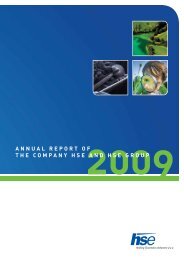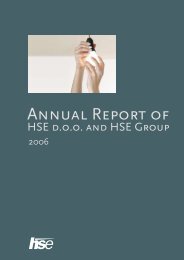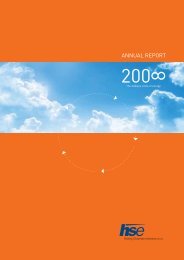Annual report - HSE
Annual report - HSE
Annual report - HSE
Create successful ePaper yourself
Turn your PDF publications into a flip-book with our unique Google optimized e-Paper software.
Production management<br />
The <strong>HSE</strong> Group’s electricity production is managed from the Control Centre in Maribor. The<br />
main objectives of production management are as follows:<br />
• to ensure minimum deviations of production and of the balancing group from schedules;<br />
• to ensure optimal distribution of power among available turbines;<br />
• to promptly activate back-up capacities in emergency situations.<br />
The quality of management of the <strong>HSE</strong> balancing group is reflected in the minimisation<br />
of deviation costs thanks to the deviations of balancing group members being reduced<br />
through adjustment of their production. In 2012, the members of <strong>HSE</strong> balancing group<br />
were production units of the <strong>HSE</strong> Group, including small HPPs, PV, larger consumers<br />
connected to transmission network, balancing subgroup of four distribution companies,<br />
one balancing subgroup SODO and some smaller consumers. The balancing group’s<br />
deviations include all production and consumption deviations from forecast schedules.<br />
The <strong>HSE</strong> Group estimates that the management of balancing group of the <strong>HSE</strong> Group in<br />
2012 was successful since deviations arose in the framework of set goals. The capacity<br />
was allocated optimally with regard to daily conditions, while all reserve capabilities were<br />
timely activated in case of emergencies.<br />
It has been estimated that quantity risks were managed appropriately, taking into account<br />
given limitations.<br />
Financial risks<br />
Difficult economic conditions and global financial and economic crisis had an important<br />
impact on operations and operational uncertainty also in 2012. The financial conditions on<br />
the markets in Slovenia and Europe are worrying. Consequences of financial and economic<br />
crisis, European debt crisis, bad economic situation in the Eurozone, plummeting credit<br />
rating of Slovenia, poor capital situation of domestic and Eurozone banks make the financial<br />
markets conditions all the more severe. Lending activities of banks have been limited and<br />
loans have been granted under the strictest conditions. In addition to blocked economic<br />
growth, companies have been tackling issues with obtaining new financial resources and<br />
extending repayment of the current ones, which can lead to deterioration of solvency and<br />
delayed settlement of liabilities.<br />
In 2012, the <strong>HSE</strong> Group continued to focus on its exposure to various types of financial<br />
risks and to carry out risk management measures and activities. Management and thus<br />
limitation of financial risks in such conditions is crucial for ensuring stable operations and<br />
development and, consequently, stable growth and value of the Group. It was another<br />
year for the <strong>HSE</strong> Group to carry out its operations with the diligence of business and<br />
financial expertise, and to strive to maintain its short-term and long-term solvency and<br />
capital adequacy. In 2012, the <strong>HSE</strong> Group companies were successful in adapting to severer<br />
operating conditions and changes in financial markets, as well as in managing financial<br />
risks, which helped them to preserve a stable financial position.<br />
More detailed disclosure of financial risks (liquidity, credit, interest, currency risk) is<br />
available in the financial part of this <strong>Annual</strong> Report, in Notes 4.5.8.8 and 5.5.8.8.<br />
The risk of financial discipline of banks and financial institutions arising from investing<br />
of available funds has also been managed adequately, as the company considers the<br />
principle of dispersion of all deposits in individual banks, with cash investments for daily<br />
short-term operations (in the form of ‘overnight’ and ‘redeemable at notice’ deposits) and<br />
through cash pooling.<br />
Transactions of derivatives for hedging against interest rate and currency risk are concluded<br />
with commercial banks on the basis of standard ISDA contracts and it is estimated that the<br />
possibility of their non-performance is minimal.<br />
<strong>Annual</strong> Report <strong>HSE</strong> 2012<br />
2 Business Report<br />
88<br />
Moreover, the data on current operations of banks, with which the controlling company<br />
cooperates, is also monitored. The controlling company sends subsidiaries within the <strong>HSE</strong><br />
Group recommendations in relation to investment of available funds.<br />
It has been estimated that financial risks were managed adequately, considering the given<br />
limitations.
















